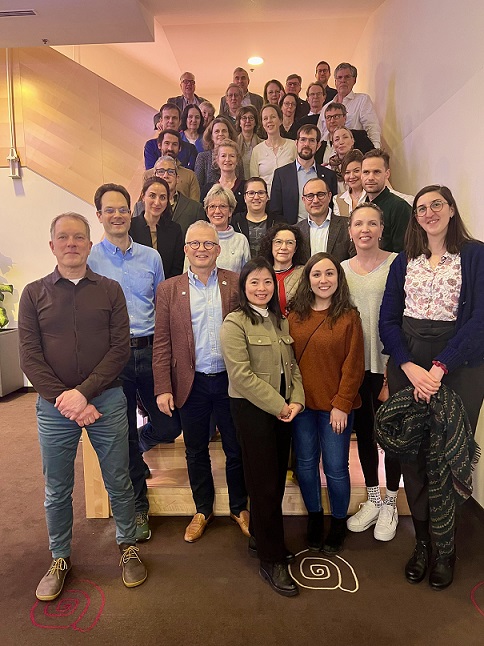On February 10-11, 2025, the VASCA Winter Meeting brought together dedicated medical professionals, researchers, and patient representatives to share insights and collaborate on improving care for individuals with vascular anomalies.
VASCERN is one of the European Reference Networks (ERNs) focused on rare multi system vascular diseases. As an organization, we are affiliated with both ERN VASCERN and SKIN.
All healthcare providers involved are part of nationally recognized reference or excellence centers in their respective countries. These professionals have established extensive European collaborations through their specific rare disease networks. They joined this ERN to promote and strengthen European cooperation in the field of rare multi system vascular diseases, following a shared, multidisciplinary approach to patient care, with the goal of tackling challenges together.
Healthcare providers are committed to improving diagnosis, treatment, and care for and with patients by leveraging all the opportunities and activities that VASCERN offers.
What makes this conference unique is that doctors and patient organizations from across Europe come together for two days to collaborate intensively.
As an organization, we are participants in the Vascular Anomalies Working Group: VASCA Working Group.
Day 1: Driving innovation in patient care and research
The first day kicked off with a warm welcome from Prof. Miikka Vikkula, setting a positive tone for discussions on clinical guidelines, patient registries, and collaborative research efforts.
Refining patient pathways and best practices
A significant part of the day was dedicated to finding better ways to care for patients. Key discussions included:
- The VAS Atlas, an international initiative collecting and documenting vascular anomaly cases to improve clinical understanding and awareness.
- New Do’s and Don’ts factsheets with practical advice to help healthcare providers and patients navigate lymphatic malformations and arteriovenous malformations (AVMs).
Expanding data and registry efforts
Data collection and registries remain a key pillar of VASCA’s work. Updates included:
- Progress on VASCA’s central registry, which is growing to include more centers.
- The NARRATIVE extension, designed to enhance the depth of patient data collection and analysis.
- A discussion on Orphanet Codes, ensuring rare vascular conditions are classified correctly for better research and treatment tracking.
Empowering patients through research and education
Sessions also tackled patient education, pregnancy and contraception considerations, and the latest scientific advancements. One of the most anticipated updates was about a new information leaflet designed to help patients with vascular anomalies navigate pregnancy safely and confidently. This resource is expected to be available soon.
The day wrapped up with an update on VASCERN’s education efforts, including:
- Plans for the Summer School 2025, which received over 200 applications from medical students, residents and post-doctoral researcher across Europe and beyond.
- Training programs for developing partner countries, with discussions on potential Erasmus+ funding to facilitate staff mobility and knowledge exchange.
After a long day of insightful discussions, the day ended with an opportunity for participants to connect and share experiences over dinner.
Day 2: Strengthening data and patient advocacy
The second day had a sharper focus on data management, patient registries, and patient engagement.
Enhancing data collection for better outcomes
The morning began with a session on the Bleomycin electrosclerotherapy (BEST) treatment, where experts discussed efforts to standardize best practices and treatment outcomes across centers.
A major highlight was an in-depth review of data items for the VASCA registry, ensuring that the right patient information is captured efficiently to support future research and clinical decision-making.
Patient advocacy and engagement
The final session focused on patient-centered initiatives, with discussions on:
- Creating education materials to ensure patients receive clear and accessible information about their conditions.
- Strengthening collaboration with patient organizations across Europe, ensuring better representation and support.
- The latest ERN evaluation results, which recognized the ERN’s strengths in education, networking, and patient care, while also identifying areas for improvement.
The VASCA Winter Meeting 2025 ended on an optimistic note, laying a strong foundation for future projects aimed at improving patient care and expanding international collaboration. The discussions and plans shared during these two days promise to bring real, positive changes for those affected by vascular anomalies.
For more information and resources from the VASCA group, visit their dedicated page.
